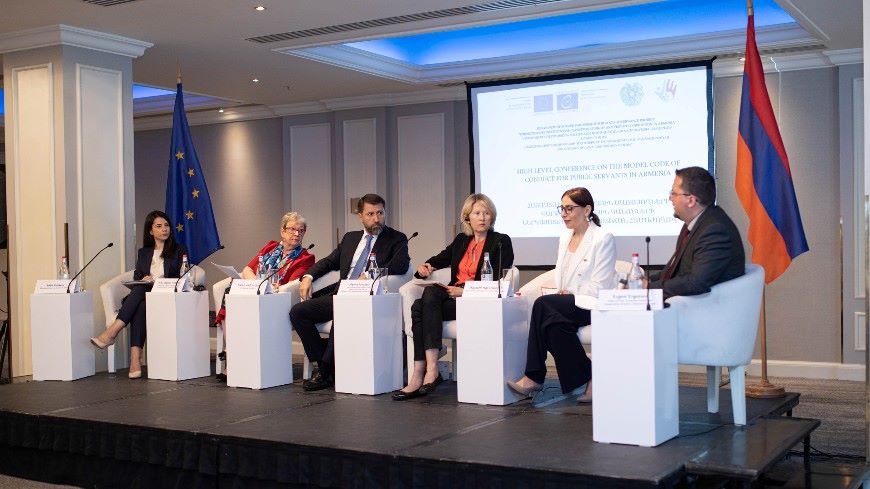The Council of Europe and the Corruption Prevention Commission of the Republic of Armenia jointly organised a “High-level Conference on the Model Code of Conduct for Public Servants in Armenia” on 4th July in Yerevann, Armenia. The conference concludes and complements the process of development and adoption of the Model Code of Conduct for Public Servants, and, at the same time, launches the process of development and adoption of specific Codes of Conduct by all Armenian public institutions, based on these model rules.
The purpose of this high-level event was to present and publicise the final version of the Model Code highlighting its importance in the development of the corruption prevention system of Armenia, and to promote the next steps – namely: the adoption of specific codes of conduct by all institutions, as well as associated guidance and training, for an effective implementation of the rules and systematic promotion of ethical practices at all levels of public service.
The Minister of Justice of the Republic of Armenia, the Ambassador of the European Union to Armenia, and the Executive Secretary of GRECO and Head of the Action against Economic Crime Department of the Council of Europe made keynote speeches, where they highlighted the importance of this area of work, and Armenia’s commitment to progress further with an effective anti-corruption system in line with European standards.
Participants in the event, who included over sixty representatives from parliament, public authorities, the judiciary and civil society, also benefited from interventions describing the experiences of other countries with the adoption and implementation of rules and codes of conduct as key parts of the national anti-corruption system. In particular, the Deputy Minister of Justice of Albania shared the experience of Albania and other countries in this regard.
The development, promotion and guidance on the Model Code of Conduct is envisaged in the Armenian Public Service Law as part of the Corruption Prevention Commission’s mandate. Furthermore, the adoption of codes of conduct for public officials is one of the recommended actions by the Group of States against Corruption (GRECO).
The adopted Model Code of Conduct for Public Servants in Armenia was developed through the cooperation between the Corruption Prevention Commission of Armenia (CPC) and the Council of Europe within the framework of the PGGII Project on “Strengthening institutional capacities to fight and prevent corruption in Armenia”. The model code is the result of a long process of public consultation, modifications, and official approvals, which began in 2021. The process of finalisation of the Model Code was facilitated by a conference on corruption prevention, integrity and codes of conduct held in February 2022, and included extensive national consultation, the outcomes of which were taken into account in the endorsed version of the Model Code.
Following the high-level conference, the Head of the Action against Economic Crime Department of the Council of Europe and Executive Secretary of GRECO discussed the pace of the anti-corruption reforms with the Deputy Prime Minister, the Minister of Justice of the Republic of Armenia, the Chair of the Corruption Prevention Commission and the Ambassador of the European Union to Armenia. Noting the commitment of the authorities to effective reforms to the benefit of the society, the Head of the Action against Economic Crime Department underlined the continued readiness of the Council of Europe to support the strengthening of the effectiveness of the anti-corruption measures.
The Council of Europe through the PGGII project will continue supporting the Armenian authorities in the implementation of the Model Code of Conduct for Public Servants, including the further adoption of specific Codes of Conducts for different categories of officials and related guidance and training.
This activity was organised in the framework of the Project on “Strengthening institutional capacities to fight and prevent corruption in Armenia” which is co-funded by the European Union and the Council of Europe and implemented by the Council of Europe in their Partnership for Good Governance II.




